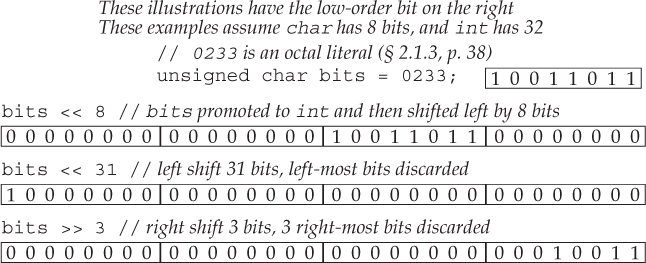 Bitwise Shift Operators
by Barbara E. Moo, Josée Lajoie, Stanley B. Lippman
C++ Primer, Fifth Edition
Bitwise Shift Operators
by Barbara E. Moo, Josée Lajoie, Stanley B. Lippman
C++ Primer, Fifth Edition
- Title Page
- Copyright Page
- Dedication Page
- Contents
- New Features in C++11
- Preface
- Chapter 1. Getting Started
- Part I. The Basics
- Contents
- Chapter 2. Variables and Basic Types
- Chapter 3. Strings, Vectors, and Arrays
- Chapter 4. Expressions
- Contents
- 4.1. Fundamentals
- 4.2. Arithmetic Operators
- 4.3. Logical and Relational Operators
- 4.4. Assignment Operators
- 4.5. Increment and Decrement Operators
- 4.6. The Member Access Operators
- 4.7. The Conditional Operator
- 4.8. The Bitwise Operators
- 4.9. The sizeof Operator
- 4.10. Comma Operator
- 4.11. Type Conversions
- 4.12. Operator Precedence Table
- Chapter Summary
- Defined Terms
- Chapter 5. Statements
- Chapter 6. Functions
- Chapter 7. Classes
- Part II. The C++ Library
- Contents
- Chapter 8. The IO Library
- Chapter 9. Sequential Containers
- Chapter 10. Generic Algorithms
- Chapter 11. Associative Containers
- Chapter 12. Dynamic Memory
- Part III. Tools for Class Authors
- Contents
- Chapter 13. Copy Control
- Chapter 14. Overloaded Operations and Conversions
- Contents
- 14.1. Basic Concepts
- 14.2. Input and Output Operators
- 14.3. Arithmetic and Relational Operators
- 14.4. Assignment Operators
- 14.5. Subscript Operator
- 14.6. Increment and Decrement Operators
- 14.7. Member Access Operators
- 14.8. Function-Call Operator
- 14.9. Overloading, Conversions, and Operators
- Chapter Summary
- Defined Terms
- Chapter 15. Object-Oriented Programming
- Contents
- 15.1. OOP: An Overview
- 15.2. Defining Base and Derived Classes
- 15.3. Virtual Functions
- 15.4. Abstract Base Classes
- 15.5. Access Control and Inheritance
- 15.6. Class Scope under Inheritance
- 15.7. Constructors and Copy Control
- 15.8. Containers and Inheritance
- 15.9. Text Queries Revisited
- Chapter Summary
- Defined Terms
- Chapter 16. Templates and Generic Programming
- Part IV. Advanced Topics
- Contents
- Chapter 17. Specialized Library Facilities
- Chapter 18. Tools for Large Programs
- Chapter 19. Specialized Tools and Techniques
- Appendix A. The Library
- Contents
- A.1. Library Names and Headers
- A.2. A Brief Tour of the Algorithms
- A.2.1. Algorithms to Find an Object
- A.2.2. Other Read-Only Algorithms
- A.2.3. Binary Search Algorithms
- A.2.4. Algorithms That Write Container Elements
- A.2.5. Partitioning and Sorting Algorithms
- A.2.6. General Reordering Operations
- A.2.7. Permutation Algorithms
- A.2.8. Set Algorithms for Sorted Sequences
- A.2.9. Minimum and Maximum Values
- A.2.10. Numeric Algorithms
- A.3. Random Numbers
- Index
- Add Pages
Bitwise Shift Operators
We have already used the overloaded versions of the >> and << operators that the IO library defines to do input and output. The built-in meaning of these operators is that they perform a bitwise shift on their operands. They yield a value that is a copy of the (possibly promoted) left-hand operand with the bits shifted as directed by the right-hand operand. The right-hand operand must not be negative and must be a value that is strictly less than the number of bits in the result. Otherwise, the operation is undefined. The bits are shifted left (<<) or right (>>). Bits that are shifted off the end are discarded:

The left-shift operator (the << operator) inserts 0-valued bits on the right. The behavior of the right-shift operator (the >> operator) depends on the type of the left-hand operand: If that operand is unsigned, then the operator inserts 0-valued bits on the left; if it is a signed type, the result is implementation defined—either copies of the sign bit or 0-valued bits are inserted on the left.
-
No Comment